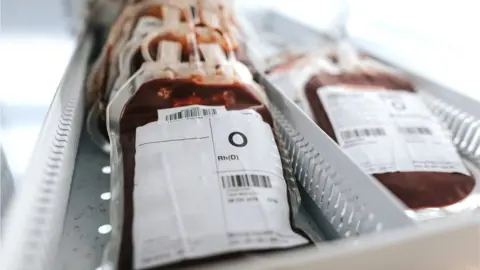Scottish infected blood victims to receive payouts next week
Scottish victims of the infected blood scandal of the 1970s and 80s will receive compensation by the end of October, the UK government has said.
It confirmed that thousands of patients who contracted Hepatitis C or HIV from contaminated blood will be given an interim payment of £100,000.
If the patient has died, their partner will receive the cash instead.
The Scottish government said it "welcomed the UK government commitment to funding interim payments".
Public Health minister Maree Todd said: "We recognise how important the issue of interim payments has been for Scottish Infected Blood Support Scheme (SIBSS) members, and those in the other UK support schemes, who have suffered for so long."
"The interim compensation payments will build on the support already provided by SIBSS to many of those affected by this tragedy."
The Cabinet Office made the announcement following a report by blood inquiry chairman Sir Brian Langstaff in July, saying the payments should be made "without delay".
He said the money should fund immediate bills and care needs, with final recommendations on compensation for a wider group of people expected when the inquiry concludes next year.
An independent study commissioned by the government in June said victims should be compensated for physical and social injury, the stigma of the disease, the impact on family and work life and the cost of care.
The payments will not be subject to tax or national insurance deductions, or reduce any benefits being received.
It is estimated that about 3,000 people in Scotland were infected with Hepatitis C through NHS blood or blood products in the 1970s through to 1991. Some were also infected with HIV in the early 1980s.
People across the UK and around the world fell victim.
 Getty Images
Getty ImagesPatrick McGuire of Thompsons Solicitors in Glasgow, the firm representing a number of the victims, said people were "generally very happy" that compensation payments were beginning.
However, he added: "If I was going to be hyper-critical I would say that it's taken a long time coming - but certainly this is a substantial sum of money that each victim of the contaminated blood scandal will receive and it's therefore to be welcomed.
"Another very important thing to bear in mind is this is the first time the government has used the word compensation.
"There have been support payments in the past but this is the first time that finally that word is being used and it's vital that is recognised as what is happening here - that the victims are being compensated for wrongs that were inflicted on them by the UK government."
The total bill to the taxpayer for the initial payments is expected to reach around £400m for the UK.
The government is set to respond to any further inquiry recommendations when it concludes next year.
Ms Todd added: "The Scottish government is grateful to Sir Brian for the interim report and welcomes the UK government's commitment to funding the interim payments.
"Existing SIBSS beneficiaries - both infected beneficiaries and widows, widowers or long-term partners of an infected beneficiary who has died - will receive an interim payment of £100,000 on 28 October.
"These are being administered by the Scottish ministers in conjunction with NHS National Services Scotland on behalf of the UK government."
The infected blood inquiry, which began in 2018, has taken evidence from more than 5,000 witnesses during hearings across all four UK nations.
Patients and their families described being kept in the dark about the risk of HIV infection among haemophiliac patients, having to keep diagnoses private through fear during the Aids crisis, and living with the physical effects of HIV.
Most of those involved had the blood-clotting disorder haemophilia and relied on regular injections of the US product Factor VIII to survive.
They were unaware they were receiving contaminated product from people who were paid to donate, including prisoners and drug addicts.
Across the UK new cases of HIV and hepatitis continued to be diagnosed decades after the first contaminations, resulting in many early deaths.
